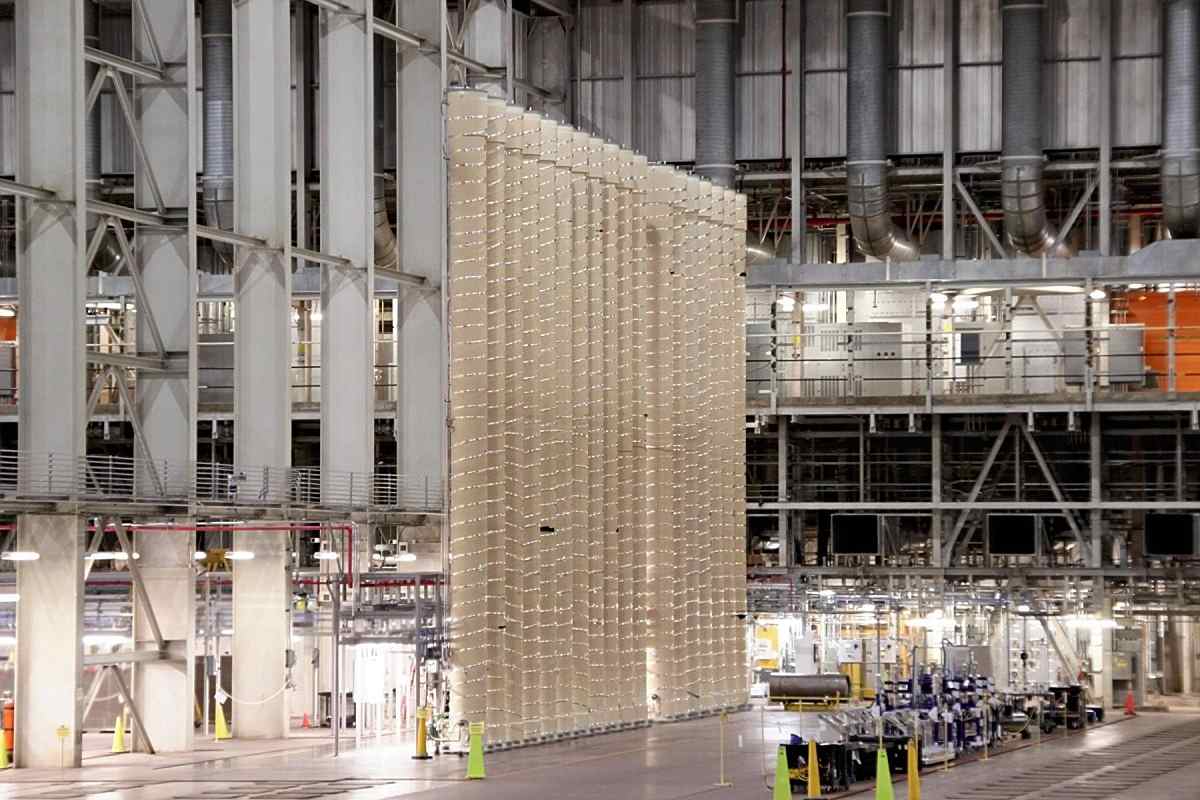
Centrus Energy Corp.’s plant is seen in Piketon, Ohio, where high-assay, low-enriched uranium (HALEU) will be produced.
20:00 JST, September 30, 2023
WASHINGTON — The production of high-assay, low-enriched uranium (HALEU), which is used for small next-generation nuclear reactors, will begin in the United States in October, according to U.S. nuclear energy company Centrus Energy Corp.
With Russia being the dominant producer of HALEU, the U.S. has been delayed in developing advanced reactors due to Russia’s aggression against Ukraine. By domestically producing the high-performance nuclear fuel, the U.S. intends to become less dependent on Russia.
China and Russia have been dominating nuclear power plant construction, while the U.S. has not built a new such plant in many years. However, it seems as if the U.S. hopes to become the leader in developing small next-generation reactors, in which Japan is also involved.
HALEU — a type of fuel with a higher uranium enrichment compared to fuel used at standard nuclear power plants — is only sold by companies affiliated with the Russian state-owned atomic energy company Rosatom. Russia’s enrichment process, which is key to manufacturing nuclear fuel, is technologically advanced, so the U.S. did not find it necessary to produce the fuel on its own prior to the war in Ukraine.
Centrus plans to begin HALEU production at its plant in Ohio with an initial target of generating 0.9 tons per year. After expanding its facilities, the company said it would be able to boost its annual output to up to 6 tons.
In November 2022, the U.S. Energy Department commissioned a HALEU manufacturing test project to Centrus and earmarked a subsidy of about $150 million (about ¥22 billion) for the company. U.S. Energy Secretary Jennifer Granholm said the move is intended to reduce U.S. dependence on hostile countries. The department estimates that more than 40 tons of HALEU fuel will be needed in the U.S. by 2030.
U.S. President Joe Biden’s administration plans to support the development of small next-generation reactors by U.S. companies and aims to export the technology to other countries. The reactors in the U.S. are expected to go into operation as early as the second half of the 2020s.
There are no concrete plans for the construction of small next-generation reactors in Japan, but U.S. firm TerraPower, LLC has advanced its development of small next-generation reactors through technological cooperation with the Japan Atomic Energy Agency and other entities.
However, TerraPower has postponed its operating start date, which was set for 2028, because a stable procurement of nuclear fuel would be difficult due to Russia’s aggression toward Ukraine. Efforts to produce HALEU in the U.S. are likely to help alleviate concerns about the fuel and give a boost to the planned development of reactors.
Nine of the 10 small next-generation nuclear reactors being developed with support from the U.S. government are designed to use HALEU.
Top Articles in World
-

Israeli Ambassador to Japan Speaks about Japan’s Role in the Reconstruction of Gaza
-

Videos Plagiarized, Reposted with False Subtitles Claiming ‘Ryukyu Belongs to China’; Anti-China False Information Also Posted in Japan
-

Nepal Bus Crash Kills 19 People, Injures 25 Including One Japanese National
-

Ukrainian Ambassador Closely Watching Japan’s Revision of Defense Export Rules, Hopes for Future Arms Support
-

China, India Tapping into Promising African Market; Beijing Announces Tariff Cuts, Both Countries Aim to Expand Exports
JN ACCESS RANKING
-

Producer Behind Pop Group XG Arrested for Cocaine Possession
-

Japan PM Takaichi’s Cabinet Resigns en Masse
-

Man Infected with Measles Reportedly Dined at Restaurant in Tokyo Station
-

Israeli Ambassador to Japan Speaks about Japan’s Role in the Reconstruction of Gaza
-

Videos Plagiarized, Reposted with False Subtitles Claiming ‘Ryukyu Belongs to China’; Anti-China False Information Also Posted in Japan


























